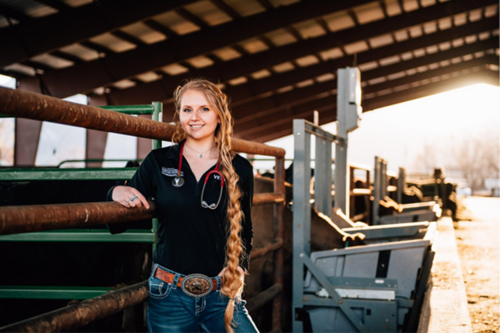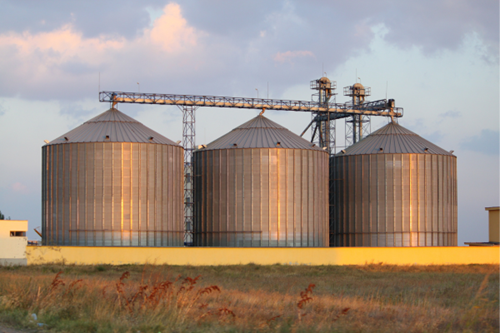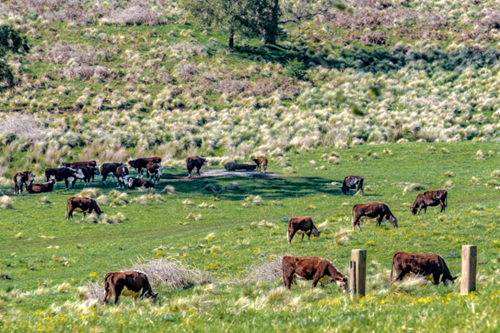Capitol Reflections: 2024 Session, Issue 4
By: Idaho Farm Bureau Governmental Affairs
“I cannot undertake to lay my finger on that article of the Constitution which granted a right to Congress of expending, on objects of benevolence, the money of their constituents.” James Madison
Vet School Resolution Introduced
 On Thursday morning, the Senate Agricultural Affairs Committee voted to introduce a resolution aimed to help address the problem of large-animal veterinarian shortages in the state. This is a simple resolution brought by the state’s livestock industry. The resolution would authorize the State Board of Education to have preliminary conversations with the state of Utah and Utah State University regarding the possibility of initiating an interstate vet program similar to the one Idaho has with Washington State University.
On Thursday morning, the Senate Agricultural Affairs Committee voted to introduce a resolution aimed to help address the problem of large-animal veterinarian shortages in the state. This is a simple resolution brought by the state’s livestock industry. The resolution would authorize the State Board of Education to have preliminary conversations with the state of Utah and Utah State University regarding the possibility of initiating an interstate vet program similar to the one Idaho has with Washington State University.
Farm Bureau members are all too familiar with the challenge of having enough large-animal veterinarians. IFBF Policy #123 states our support of efforts to incentivize vet students studying food animal medicine to practice in Idaho. Having an additional program with another neighboring state that has a vet school could allow more Idaho students to pursue training in this field.
We thank the members of the Senate Ag. Committee for voting to introduce the resolution, and we look forward to having a full hearing and committee discussion on the topic in the coming days.
Sales Tax Exemption Clarified
 A bill that would clarify items qualified for the sales tax exemption was introduced this week into the House Revenue and Taxation Committee. H446, sponsored by Rep Doug Pickett (R-Oakley) clarifies that augers, dryers, or fans used within, or attached to a grain bin, are exempt from sales tax.
A bill that would clarify items qualified for the sales tax exemption was introduced this week into the House Revenue and Taxation Committee. H446, sponsored by Rep Doug Pickett (R-Oakley) clarifies that augers, dryers, or fans used within, or attached to a grain bin, are exempt from sales tax.
Under current law, sales taxes have been collected on grain bin structures themselves since they are permanent fixtures attached to land, so they become real property. Idaho law requires sales tax on improvements to real property. However, certain accessories that can be removed and moved to other locations without affecting structural integrity are not typically subject to sales tax.
There have been recent instances where farmers have been asked to pay sales tax on these grain bin accessories, despite their traditional qualification for the production exemption.
H446 simply codifies the historic understanding of sales tax laws to ensure that these items do not become subject to sales tax in the future.
H446 will receive a hearing in the House Revenue and Taxation Committee next Wednesday morning. IFBF policy #104 states: “we oppose removing the sales tax exemption on production items.” IFBF supports H446.
Rangeland Improvement Act Introduced
 Rep Jerald Raymond (R-Menan) introduced the Rangeland Improvement Act this week in the House Resources and Conservation Committee. The purpose of H468 is to provide a mechanism to allocate state funds that will be set aside to conduct range improvement projects. These projects will be focused on state and federal lands, but could also be done on private lands where they will also benefit state or federal lands.
Rep Jerald Raymond (R-Menan) introduced the Rangeland Improvement Act this week in the House Resources and Conservation Committee. The purpose of H468 is to provide a mechanism to allocate state funds that will be set aside to conduct range improvement projects. These projects will be focused on state and federal lands, but could also be done on private lands where they will also benefit state or federal lands.
The bill states that funding is to be used for “range improvement and maintenance, the control of predatory and depredating animals, the control, management or extermination of invading species, range damaging organisms, and poisonous or noxious weeds, or any other management tool that benefits a grazing district, watershed protection, development, distribution, and improvement, the general welfare of livestock grazing within a grazing district, and monitoring of rangeland improvement projects.”
A separate appropriation of $500,000 per year is being proposed by the Governor’s office to fund the range improvement projects. This will have to be approved by both bodies before this money would be available for projects. The money will be distributed by the existing Grazing Board Central Committee, which currently directs range betterment funding available through the Taylor Grazing Act.
H468 would authorize the Governor to appoint two additional members to the Grazing Board Central Committee from nominations received from the Idaho Cattlemen’s Assoc., the Idaho Woolgrower’s Assoc., and the Idaho Farm Bureau. Farm Bureau members have watched with interest a similar program that has worked well in Utah for several years now. There is a lot of public rangeland in Idaho that could be improved with additional resources that would benefit the state, wildlife, recreationalists and ranchers. IFBF supports H468.
House Ag. Votes to Introduce Two IFBF Priorities
 This week, the House Agricultural Affairs Committee voted to introduce two IFBF legislative priorities for this session.
This week, the House Agricultural Affairs Committee voted to introduce two IFBF legislative priorities for this session.
First, RS 31105 (bill number to come) deals with the Idaho’s Plant Pest Act authority. Currently, this law allows Idaho State Department of Agriculture (ISDA) to enter both public and private property for the purpose of addressing any plant pest/disease issue. Farm Bureau’s proposed amendment would simply align ISDA’s authority to enter private property to be similar to their authority to carry out animal inspections. ISDA would need the permission of the landowner, probable cause, or a warrant before entering private property for purposes of carrying out inspections for plant pest and disease issues. Farm Bureau worked closely with ISDA to ensure that this amendment would be workable and practical for the agency. We thank the ISDA for their input and feedback on this matter.
The second is RS 31161 (bill number to come) dealing with agricultural land protection. This legislation is the revised version of last year’s H377. The bill outlines Farm Bureau’s proposal to provide an additional voluntary option for landowners to consider while thinking of ag/forestry land preservation. In short, willing landowners would make an application to the local unit of government requesting the creation of an Agricultural Protection Area (APA) over their specified parcel of land for the term of 20 years. The local government will consider the application and either approve or deny it. There is a hardship provision that would allow for early resolution of the designation prior to the end of the term for specified circumstances outside of the landowners control. It is important to note that there is no selling or trading of development rights. This program would simply put the development opportunities on hold for the duration of the term.
More details on both of these bills will come in future Capitol Reflection articles as they work themselves through the legislative process. Farm Bureau thanks the members of the House Agricultural Affairs Committee for voting to introduce these bills. We look forward to advancing them at the Statehouse this session.
Wildlife Data Bill Passes House, Moves to Senate
![]() H404 unanimously passed the House Committee on Resources & Conservation on Monday with a do-pass recommendation and then passed on the House floor Thursday on a 57-12 vote. Two members were absent. As a reminder, the bill limits the ability for entities to access records obtained through GPS, collars, or game cameras showing where wildlife exists on public or private land. AFBF Policy 567.6.1 supports legislation that prevents harassment of hunters. IFBF believes this bill will also help prevent animal rights groups from using these methods to chase animals away, trespass, or harass landowners and producers. The bill gives discretion to the Idaho Department of Fish and Game to determine who they share information with and to what extent. We will continue to advocate for this bill as it now moves to the Senate. IFBF supports H404.
H404 unanimously passed the House Committee on Resources & Conservation on Monday with a do-pass recommendation and then passed on the House floor Thursday on a 57-12 vote. Two members were absent. As a reminder, the bill limits the ability for entities to access records obtained through GPS, collars, or game cameras showing where wildlife exists on public or private land. AFBF Policy 567.6.1 supports legislation that prevents harassment of hunters. IFBF believes this bill will also help prevent animal rights groups from using these methods to chase animals away, trespass, or harass landowners and producers. The bill gives discretion to the Idaho Department of Fish and Game to determine who they share information with and to what extent. We will continue to advocate for this bill as it now moves to the Senate. IFBF supports H404.
IFBF Legislative Intern Program
 “Nearly all Legislation is a result of compromise” -Joseph Gurney Cannon I read this quote when I was in college doing a research paper on the legislative process for a government class. Since then, this was my view of the legislative process. While I wasn’t totally off base and there is some truth to this quote from Mr. Cannon, I have come to learn I was missing a key part in the entire legislative process. Relationships.
“Nearly all Legislation is a result of compromise” -Joseph Gurney Cannon I read this quote when I was in college doing a research paper on the legislative process for a government class. Since then, this was my view of the legislative process. While I wasn’t totally off base and there is some truth to this quote from Mr. Cannon, I have come to learn I was missing a key part in the entire legislative process. Relationships.
Hi, I am Kylee Urie, the Idaho Farm Bureau Federation Regional Manager from District 1. This being my first year with IFBF as a staff member, I was lucky enough to come to Boise and spend a while with the Governmental Affairs team. I had the opportunity to experience the 67th Idaho legislative session. I got to see firsthand how the legislative process works. Throughout the week I got to follow along with each of the Governmental Affairs team members. The Idaho Farm Bureau Governmental Affairs team consists of Russ Hendricks, Braden Jensen, and Dexton Lake. We attended committee meetings, had sit-downs with Representatives and Senators to talk about certain bills, and got to attend some floor sessions. We also attended several group meetings, such as the Idaho Association of Commerce and Industry (IACI) and the Food Producers of Idaho. And we walked a lot!
Seeing how our policy is brought up by our grassroots members and put into actual legislation was the coolest part of my experience. Sometimes it gets hard to see the full picture when you’re just viewing from a county level. When you see the finished product of what once was an idea from a county member, it all becomes very full circle. It has given me a new sense of appreciation for the process we have set up within the Farm Bureau.
When walking down the halls of the Capitol with any of the governmental affairs team, we hear, “Hello Russ,” or “Hey Braden, good work on bill ####,” or even just “Hey Farm Bureau, now there are some of my favorite faces to see in this hall.” It is evident that the Farm Bureau has a positive presence in the Capitol.The Government Affairs team and our members have done such a good job at building positive relationships with elected officials, which in turn helps our voices and concerns be heard.
This past week I have seen how powerful our voice is as agriculturalists. It has inspired me to keep letting my voice be heard and help others in my district to do the same. I encourage our members to have a voice in their communities, counties and with their elected officials. I also encourage you to seek out your local legislators and build a relationship with them. Invite them to board meetings and have conversations about issues we face daily. Lastly, I encourage you to sign up for the legislative intern program with the Idaho Farm Bureau. Come to Boise and experience this for yourself firsthand. (Just ensure you have a good pair of walking shoes)
------------------------------------------------------------------------------------
Resources Available to Follow During Session:
Legislative Website Homepage: HERE
2024 Legislative Session Bill Center: HERE
List of Senate Committee Assignments: HERE
List of House Committee Assignments: HERE
Current Senate Committee Agendas: HERE
Current House Committee Agendas: HERE
Watch Committee Meetings and Floor Sessions Live: HERE
Governor’s Bill Action and Legislative Communications: HERE
Still can't find what you are looking for? Find by topic:
- Achievement Award (YF&R)
- Actions Alerts
- Advocacy
- Ag Ambassadors
- American Farm Bureau
- American Farm Bureau Policy Book
- Archive Photos
- Articles
- Board of Directors
- Calendar - State/District
- Calendar - County
- Capitol Reflections
- Collegiate Chapters
- Committee Application Form
- Commodities
- Convention Annual
- County Presidents & Board Information
- County Resource Page
- Delegate Form
- Discount Programs
- Discussion Meet
- Discussion Meet - High School
- Education Programs
- Events
- Excellence Award (YF&R)
- Expense Voucher
- Flickr
- Gem State Producer
- High School Discussion Meet
- High School Speech Contest
- Hope in Idaho Ag
- House of Delegates Credentials Form
- IFBF Board of Directors
- IFBF Policy Book
- IFBF Staff
- Insurance
- Legislative Action Program
- Legislative Issues
- Library
- MAC Trailer
- Magazines
- Map My Benefits
- Member Benefits
- Member Discount
- Membership Application
- Mission Statement
- Moving Agriculture to the Classroom
- Newsletter Sign up
- News Releases
- News Room
- Open Range Law
